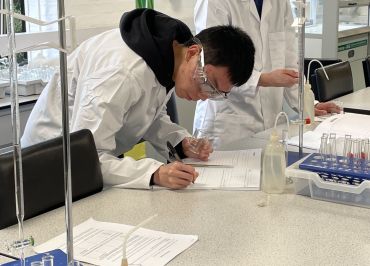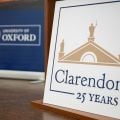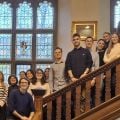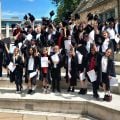
Astrophoria Foundation Year: Dr Jo Begbie reflects on the programme’s first year
Astrophoria’s Programme Director, Dr Jo Begbie, speaks about the programme’s first year and shares her highlights.
As the end of the academic year fast approaches, twenty-two students from across the UK will soon be completing the University’s first Astrophoria Foundation Year. Providing a one-year fully funded course for UK state school students who have experienced severe personal disadvantage or disruption to their education, the Astrophoria programme is designed to enable motivated students to reach their academic potential by bridging the gap between A-Levels and Oxford’s challenging undergraduate degrees.
It is led by Dr Jo Begbie, who has had plenty of experience of educational environments prior to arriving in Oxford in 2004: completing her undergraduate degree at Leeds, a PhD at UCL, and postdoctoral research at King’s College, London. At Oxford, Jo started a research lab and took up the post of lecturer in Medicine, before becoming a Tutor in Medicine at one of Oxford’s colleges, Lady Margaret Hall.
 Students meet Oxford's Vice-Chancellor, Professor Irene Tracey and Astrophoria Director, Jo Begbie, during their orientation week
Students meet Oxford's Vice-Chancellor, Professor Irene Tracey and Astrophoria Director, Jo Begbie, during their orientation week“And then as a medicine tutor doing admissions, I could see that there were students that had potential but weren’t going to get the grades to come into Oxford, and often they were young people from less advantaged backgrounds – Astrophoria is about putting those two things together.”
Foundation Years can mean different things for different institutions, says Jo. At Oxford, the Astrophoria programme – which follows on from a college-based initiative Jo was involved in at Lady Margaret Hall – provides lower contextualised offers for entry to study. But importantly, according to Jo, “rather than lowering grades for undergraduate study and expecting them to cope”, it gives the students a year of support, both academic and personal (there is a dedicated welfare role in the team), before they join the undergraduate student body.
Over the course of the academic year, students not only receive teaching in their chosen subject (in Humanities, Law, PPE, or CEMS (Chemistry, Engineering, and Material Science) ), they also undertake a Preparation for Undergraduate Studies course. “It’s thinking about what academic skills they might require and recognising they may need support in order to thrive on an undergraduate course,” Jo says, “but also helping them build that sense of belonging in an academic institution like Oxford, which has its own nuances and distinct learning environment and can be quite a big step for some students.”
 Chemistry student Yihao during his first term as an Astrophoria student at Oxford
Chemistry student Yihao during his first term as an Astrophoria student at OxfordThe first Astrophoria students arrived last September for their Orientation Week, which, Jo says, was “really important for building that sense of belonging and starting to do some critical thinking, but in a slightly more playful way. It’s quite deliberately set up to get them to be engaged in asking questions and starting to build their confidence.”
The students are based across 9 Oxford colleges, coming together for different aspects of the course and events. So how well have the cohort integrated into the wider student body? “We were a bit nervous about that” says Jo, “but, it hasn’t been an issue – they’ve been embraced by their colleges and just treated like any other student”.
A dedicated Outreach Officer in Jo’s team visits schools to build awareness of the Astrophoria programme among teachers and students. The reaction is overwhelmingly positive: “There’s quite often – more from the teachers – ‘oh, this really is as good as it sounds’”.
The team are focused on ensuring that eligible applicants feel motivated to apply. “There are still some students who think that Oxford’s not going to be for them, but it’s nice to begin to build our cohort of students who’ve been through the programme, to be able to use their voices to go back to schools so that they can try and dispel some myths about who Oxford is for.”
 Astrophoria students speak about their experiences at an event in Oxford
Astrophoria students speak about their experiences at an event in OxfordReflecting on the programme’s inaugural year, Jo’s personal highlights come from the students and how they’ve developed, which she has seen first-hand through teaching as part of the Preparation for Undergraduate Study courses. “Some students in the first term are very nervous, very shy, very unsure and they’ve just grown in confidence and engagement in talking about things.”
A recent assessment in which the students presented posters addressing an academic question was a particular high point: “For me, the energy just really summed up the Astrophoria year. There were 22 students talking animatedly about an academic topic they were interested in, and they were energised but also supportive of each other and explaining their work to one another. Essentially that’s what we’ve been trying to build – we talk about a community and support network, an excitement in the academic work that they’re doing, and a willingness to present things."
Another ‘proud mum’ moment, as she calls them, came at an event with the Astrophoria donor. “Two of the students gave speeches and you just felt ‘wow’. They'd only been here a term but were happy to stand up and speak at an event”.
Have there been any surprises this year? Nothing major, she says, but “dealing with 22 young people there’s always something!”. Inevitably, says Jo, the programme will evolve as lessons are learnt, and the goal is to steadily increase the number of Astrophoria students over the next few years. Some of this year’s cohort may not progress on to Oxford’s undergraduate courses, but Jo hopes they have all benefitted from the programme and their Oxford experience; “I want the students to feel empowered”, she says.
Find out more about the Astrophoria Foundation Year.
 What Louise Thompson’s campaign tells us about the national maternity crisis
What Louise Thompson’s campaign tells us about the national maternity crisis Celebrating 25 Years of Clarendon
Celebrating 25 Years of Clarendon  Learning for peace: global governance education at Oxford
Learning for peace: global governance education at Oxford  What US intervention could mean for displaced Venezuelans
What US intervention could mean for displaced Venezuelans  10 years on: The Oxford learning centre making an impact
10 years on: The Oxford learning centre making an impact Oxford and The Brilliant Club: inspiring the next generation of scholars
Oxford and The Brilliant Club: inspiring the next generation of scholars New course launched for the next generation of creative translators
New course launched for the next generation of creative translators The art of translation – raising the profile of languages in schools
The art of translation – raising the profile of languages in schools